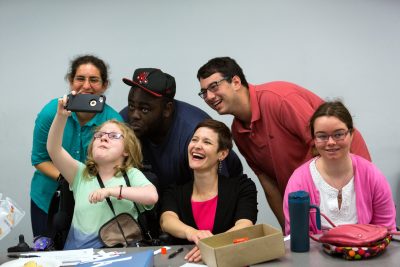What is participatory action research?
The YELL Lab using a participatory action research approach for all of our work. Participatory action research is a research approach in which stakeholders are involved in the entire process as co-researchers. Youth and young adults with developmental disabilities help us design tools and interventions. The youth and young adults also collect and analyze data.
The YELL PAR collaborations help us conduct better research and lead to tools and interventions that are more likely to meet the needs of and empower youth and young adults with disabilities.
To learn more about how Dr. Kramer supports the employment of researchers with disabilities in the YELL Lab.
Our website features videos and images of our PAR Youth Panel collaborators in action!
Project TEAM Youth Panel
The Project TEAM youth panel has worked together since 2010 to design and study Project TEAM:
- The youth panel designed the Game Plan to be easy to understand and use by youth and young adults with disabilities.
- The youth panel designed many Project TEAM learning activities.
- The youth panel conducted two evaluations of Project TEAM. Using this data, the youth panel determined what youth and young adults like about Project TEAM, and made revisions to improve Project TEAM.
The Project TEAM youth panel received the YAY! Award from Massachusetts Advocates for Children for their work developing Project TEAM.
Read more about Project TEAM Youth Panel’s research:
Kramer, J., Barth, Y., Curtis, K., Livingston, K., O’Neil, M., Smith, Z., Vallier, S., & Wolfe, A. (2013). Involving youth with disabilities in the development and evaluation of a new advocacy training: Project TEAM. Disability and Rehabilitation, 35(7), 614- 622. doi: 10.3109/09638288.2012.705218
PEDI-PRO Youth Panel
The PEDI-PRO youth panel has worked together since 2013 to develop and study the PEDI-PRO. This collaboration has led to:
- Unique conceptual framework: assessment of functional tasks in the context of everyday life situations.
- Generation of 36 new functional tasks not assessed in any currently available patient-reported outcome measure.
- Revision of parent-report PEDI-CAT items to ensure appropriateness and relevance for youth and young adults with DD.
Read more about the PEDI-PRO Youth Panel’s research.
